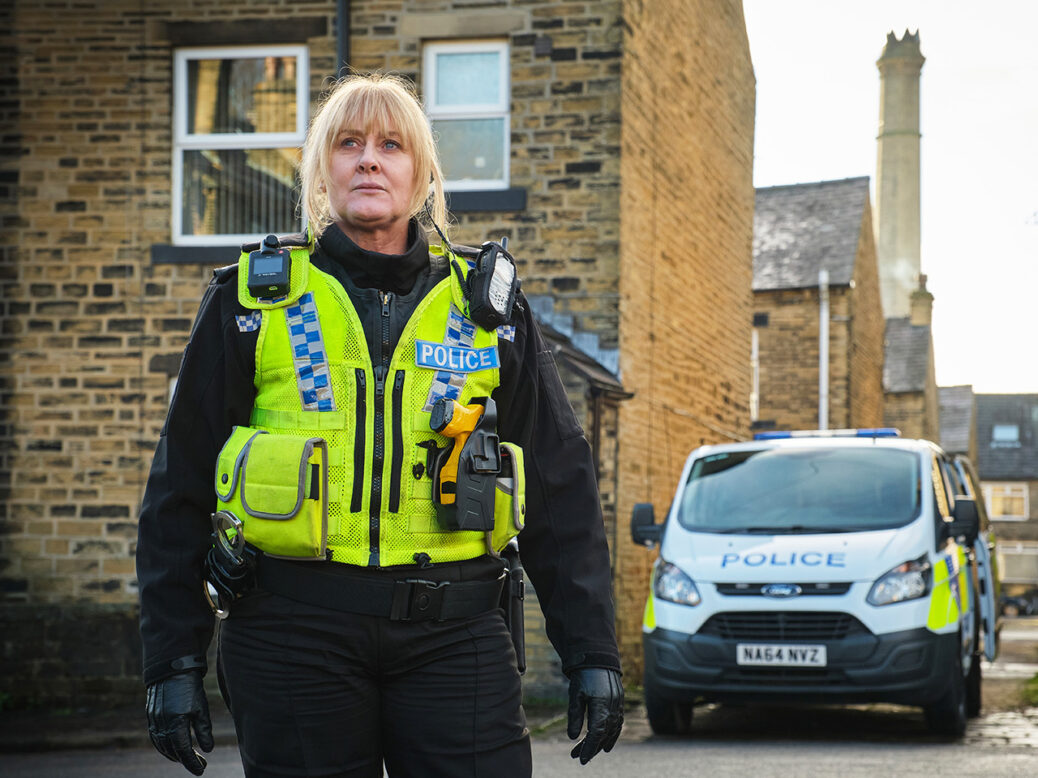
In the first episode of Happy Valley Sergeant Catherine Cawood is introduced swinging a fire extinguisher under one arm, with a pair of sunglasses perched on her nose, both hastily acquired from the nearest newsagent. A man is threatening to set himself on fire, and an ambulance and police back-up are on the way, but in the meantime “the big thing is to keep the subject engaged in conversation”. No trouble there. Catherine – unphased, blunt, almost breezy – delivers a monologue that holds the subject’s, and the audience’s, attention.
After three seasons and 18 hours of Sally Wainwright’s small-town saga, there she was again. Ambulance and back-up dispatched, Tommy Lee Royce – armed with a small knife, a bucket of petrol and a match – across the kitchen table of her soot-coloured Hebden Bridge terrace. She is older, quieter and harder than the Catherine we first met – Sarah Lancashire’s masterful performance gradually depicting her slow embitterment, thanks to a whirlwind of violence, incompetence and betrayal. She holds Tommy’s gaze, stony-faced. In an excruciating, 15-minute-long scene, she keeps him talking, the conflict between what she knows she must do (at least attempt to keep him alive and in place until support arrives) and what, deep down, she’d like to do (watch him burn). When he does set himself alight, she uses a crochet blanket to smother the fire. Walking away from the wreckage, singed photo albums safely under her arm, Lancashire’s face is a grim, unblinking mask, seemingly void of emotion until, from somewhere, we hear high-pitched, animalistic sounds that we realise are sobs, and she crumples. It’s Lancashire at her very best.
This finale was one of the most highly anticipated television events of the decade: so much so that producers are said to have filmed five different endings to prevent leaks. Many speculated that the climax would involve Ryan, Catherine’s grandson, choosing between his grandmother and Tommy, his biological father, but, in retrospect, a final face-off between Tommy and Catherine seems the right – the only – choice.
At the start of this series Tommy seemed malevolent, manipulative and – with his long hair and crown of stitches – almost Christ-like in his power over those around him. By the time of the final confrontation he looked smaller, sadder, almost pathetic. It wasn’t the near-fatal stab wound that diminished him in Catherine’s presence. With his talk of bungee jumping, Marbella and delusions of “love”, James Norton eventually revealed something infantile about Tommy’s rage and narcissism, and gave him a sliver of humanity in the process. Catherine towers over him; it hardly feels like a fair fight. Perhaps it ended up not being a fight at all. Even as he spits at her that she’s a bitch, Tommy admits he doesn’t want Catherine to die at all. “I forgive you,” he says. “You forgive me?” she replies, stunned. “You delinquent fuck.”
Little time was given over to the show’s now familiar “weak man gets in too deep” sub-plot – a short conversation at the station let us know that Catherine had picked up on the essential clue to ensure that Faisal, the corrupt pharmacist, would be arrested for the murder of vulnerable Joanna. This left us with more space for the story that mattered: a conclusion that offered some closure, without feeling too neat.
There was an epic scale and high tension in this final showdown between two viscerally drawn and exquisitely acted characters, but it remained domestic too, playing out over old photo albums on a kitchen table. It’s a testament both to Wainwright’s deft handling of tone and Lancashire’s layered performance that when Catherine summarised, dryly, “We’ve had another bit of a tussle. I won – obviously,” it felt less like a cheap quip and more an instinctive release of relief.
This is always what Happy Valley has done best – marrying all the simmering suspense, treachery and bloodshed of a thrilling noir or western with a deep understanding of character and community that elevates it beyond its status of police procedural. Occasional preposterous plot points or genre tropes are forgiven because its pitch-perfect dialogue, bleak humour and sense of place are inimitable and irresistible. This is what kept its audience longing for its return, even after a seven-year break, and what will now leave them mourning its loss.
[See also: Happy Valley review: as magnificent as ever]






